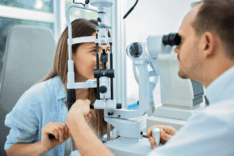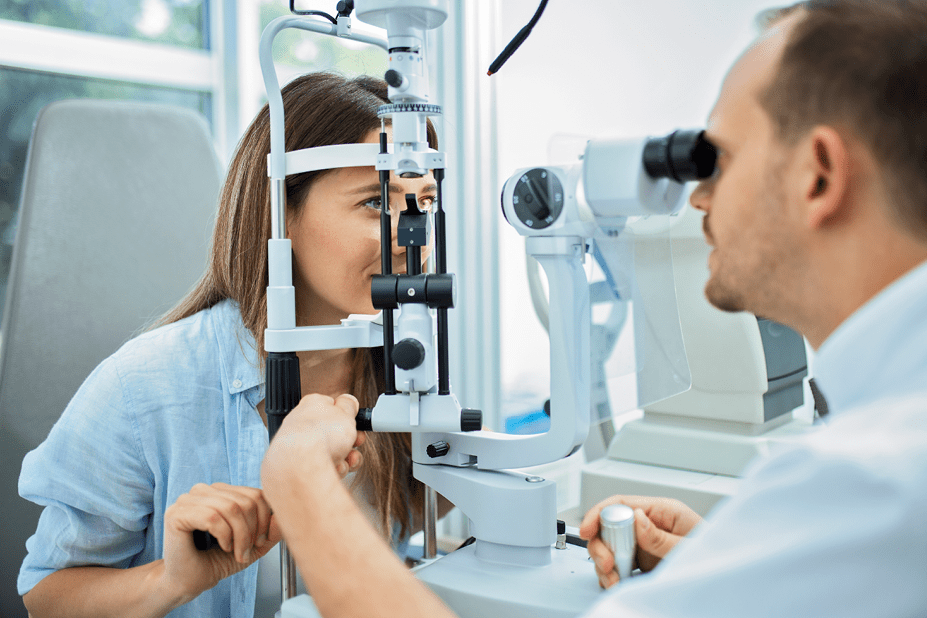Optometrist vs. Ophthalmologist: What is the Difference?

If you are confused about the difference between an optometrist and an ophthalmologist, you’re not alone! Not many people fully understand the difference between the two.
In this article we will cover the similarities and differences between optometrists and ophthalmologists so you can be confident you are seeing the correct person for your vision needs.
What is an optometrist?
According to the American Optometric Association, an optometrist examines, diagnoses, treats, and manages diseases and disorders of the eye. In addition to providing eye and vision care, they play a major role in an individual’s overall health and well-being by detecting systemic diseases and diagnosing, treating, and managing ocular manifestations of those diseases, and providing vaccinations.
Doctors of optometry complete pre-professional undergraduate education in a college or university and four years of professional education at a college of optometry, leading to the doctor of optometry (O.D.) degree. Many doctors of optometry complete an additional residency in a specific area of practice.
What is an ophthalmologist?
An ophthalmologist specializes in the diagnosis and treatment of eye diseases and disorders. Ophthalmologists are qualified to perform surgery, prescribe medication, and provide vision care.
In general, ophthalmologists’ scope of practice includes all of the care that an optometrist provides as well as secondary and tertiary eye care that includes major ocular surgery. Most ophthalmologists specialize in specific areas of the eye such as retina, glaucoma, pediatrics, etc.
To become an ophthalmologist, one must complete college and at least an additional eight years of medical training. After receiving a Doctor of Medicine degree, ophthalmologists can practice medicine and surgery on patients.
Ophthalmologists generally work in clinics and hospitals.
Optometrists and ophthalmologists are important for vision care
Both specialties are important for vision care. Often an optometrist will be the first to spot an eye abnormality and can refer a patient to an ophthalmologist for further evaluation.
Optometrists and ophthalmologists are your first line of defense against eye diseases and vision loss. Be sure to go to an eye exam each year to keep track of any changes or abnormalities in your vision. Vision insurance makes it easy to find and schedule visits with both optometrists and ophthalmologists.
Related stories
-
testh1title
testcontent123
-
How Poor Oral Health Can Lead to Disease in Old Age
You probably know by now that your oral health is connected to your overall health. But, do … Read More
-
Serving Mealtime Smiles: Giving Back Keeps Wisconsin Smiling
A healthy diet is key for oral and overall health. But for many older Americans, access to … Read More
Sign Up Now
Most Liked
- 1 Do Expiration Dates on Dental Products Matter? 305 Likes
- 2 Is Activated Charcoal Safe for your Smile? 167 Likes
- 3 Crazy and Cool Fish Teeth Facts 92 Likes
- 4 What Are Tonsil Stones? 81 Likes
- 5 Delta Dental Protects Your Eyes with DeltaVision® Coverage 74 Likes
- 6 The In-between Tooth: Guide to Bicuspids 53 Likes
- 7 Recipe: Quick Pumpkin Pudding 49 Likes
- 8 Bad Taste After Brushing? Common Explanations 44 Likes
- 9 People with Dental Benefits are Healthier 40 Likes
- 10 Own Your Oral Health: Subscribe now for tips to ensure a bright smile 39 Likes




